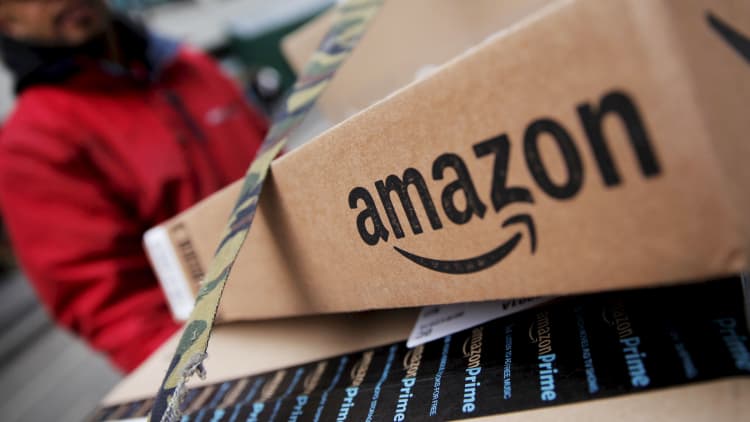FedEx investors punished the company's shares Wednesday after it released disappointing earnings a day earlier and cut its profit outlook for at least the third time in 2019.
The delivery company is struggling to adapt to the rise in e-commerce and additional costs to build out its ground network, which is more expensive to run and less profitable than its niche business-to-business delivery model.
The demand for global delivery, or air cargo shipping, is also falling as the trade war weighs on the sector and global growth slows.
″Our revised guidance reflects lower-than-expected revenue at each of our transportation segments and higher-than-expected expenses driven by continued mix shift to residential delivery services," CFO Alan Graf Jr. said in the company's earnings press release.
The company's revenue for the fiscal second quarter that ended Nov. 30 dipped by 3% to $17.3 billion, while its profit plunged by 40% to $560 million. The loss of Amazon's shipping contract alone cost the company $900 million in annual revenue.
Its shares fell about 10% on Wednesday and closed at a price of $146.86.
Slowing global shipments
The U.S.-China trade war, slowing trade and weakening economic growth are weighing on air cargo demand and setting up air freight volumes this year to be the weakest since the financial crisis, the International Air Transport Association, a trade group that represents most of the world's airlines, said earlier this month.
To cut costs and improve profits amid slowing demand, the company said it's reducing its global FedEx Express air network, restricting hiring and cutting some international and domestic flights.
The "trade war is clearly impacting Express," said Allison Poliniak-Cusic, Wells Fargo senior analyst of diversified industrials and transportation. "About 35% of their volume is tied to electronics, so it's a trade issue, they've been impacted on that side."
FedEx told analysts on a conference call discussing its fiscal second-quarter earnings Tuesday that it also retired a fleet of 10 Airbus A310-300 aircraft and has plans to retire another 29 aircraft over the next 30 months. FedEx Express took a $66 million charge due to the retirement of the 10 Airbus aircraft, according to the company's earnings release.

Increase in residential deliveries
Adapting to the rise in online shopping has been costly for FedEx, and competition in same- and next-day delivery services is fierce.
FedEx expanded its ground network to deliver year-round and seven days a week to meet demand, which also pressured profits.
"Cost headwinds at FedEx Ground are largely driven by the expansion of six- and seven-day delivery due to a minimum number of employees required to staff and operate the new schedule prior to the volume and revenue coming on," Graf said on the company's earnings call.
Other ground network changes include in-sourcing deliveries that were previously given to the U.S. Postal Service, implementing large package facilities and new short-haul services. FedEx is gradually decreasing its dependence on the Postal Service for last-mile delivery.
"The big negative surprise was the margins in ground," Poliniak-Cusic said. "They were essentially cut in half."
FedEx executives told analysts on the earnings call that 60% of the pressure on ground profits stemmed from the expansion to six- and seven-day delivery, the loss of Amazon revenue and the later timing of Cyber Week, a shopping holiday that starts the Monday after Thanksgiving. Because Thanksgiving fell later than usual this year, that shifted revenue from those deliveries into its fiscal third quarter.
Graf said FedEx is "at the bottom" and that the company will "come up off the mat" and "improve through the rest of this year and into the next."
"We have said clearly that we believe by the fourth quarter, grounds margins will be back into the teens," CEO Fred Smith said on the call. "We spent more to put the network up than we thought, but we never put up a six- or seven-day Ground network before ... but no question we missed on the cost side, but it's up and operating."
However, some analysts are hesitant to believe that FedEx has reached its bottom. Analysts at Stifel told clients in a research note Wednesday they aren't so sure it's hit bottom yet, and even if it has, "it doesn't necessarily mean the earnings or stock will rebound strongly or quickly."
"Many cuts have been taken to guidance over the past couple of years, and while we should be closer to a bottom, we believe downside risk remains," the Stifel note said.
The loss of Amazon
Graf said the loss of the Amazon contract had a bigger impact in the second quarter than the first since it expired in August.
Amazon's foray into its very own delivery service has continued to threaten FedEx. Earlier this week, Amazon said it told its third-party sellers, which make up 58% of its total merchandise sales, that they will temporarily be restricted from using FedEx's ground and home delivery for Prime orders. The move came after FedEx ended its ground-delivery contract with Amazon in August, and its domestic express shipping contract in June.

"They walked away from Amazon, which was about 1% of revenue," Poliniak-Cusic said. "They have from what I understand recovered that revenue through other accounts so it won't be a headwind, but those retail customers will not start their contract until Jan.1 after the peak season."
FedEx said on Tuesday that it now expects to earn between $10.25 and $11.50 per share on an adjusted basis, from its prior range of $11 to $13 per share. Wall Street, meanwhile, had expected full-year earnings of $12.03 per share, according to analysts polled by Refinitiv.
— CNBC's Ganesh Setty and Leslie Josephs contributed to this report.


